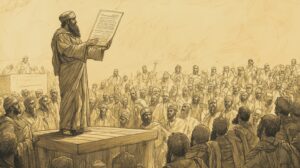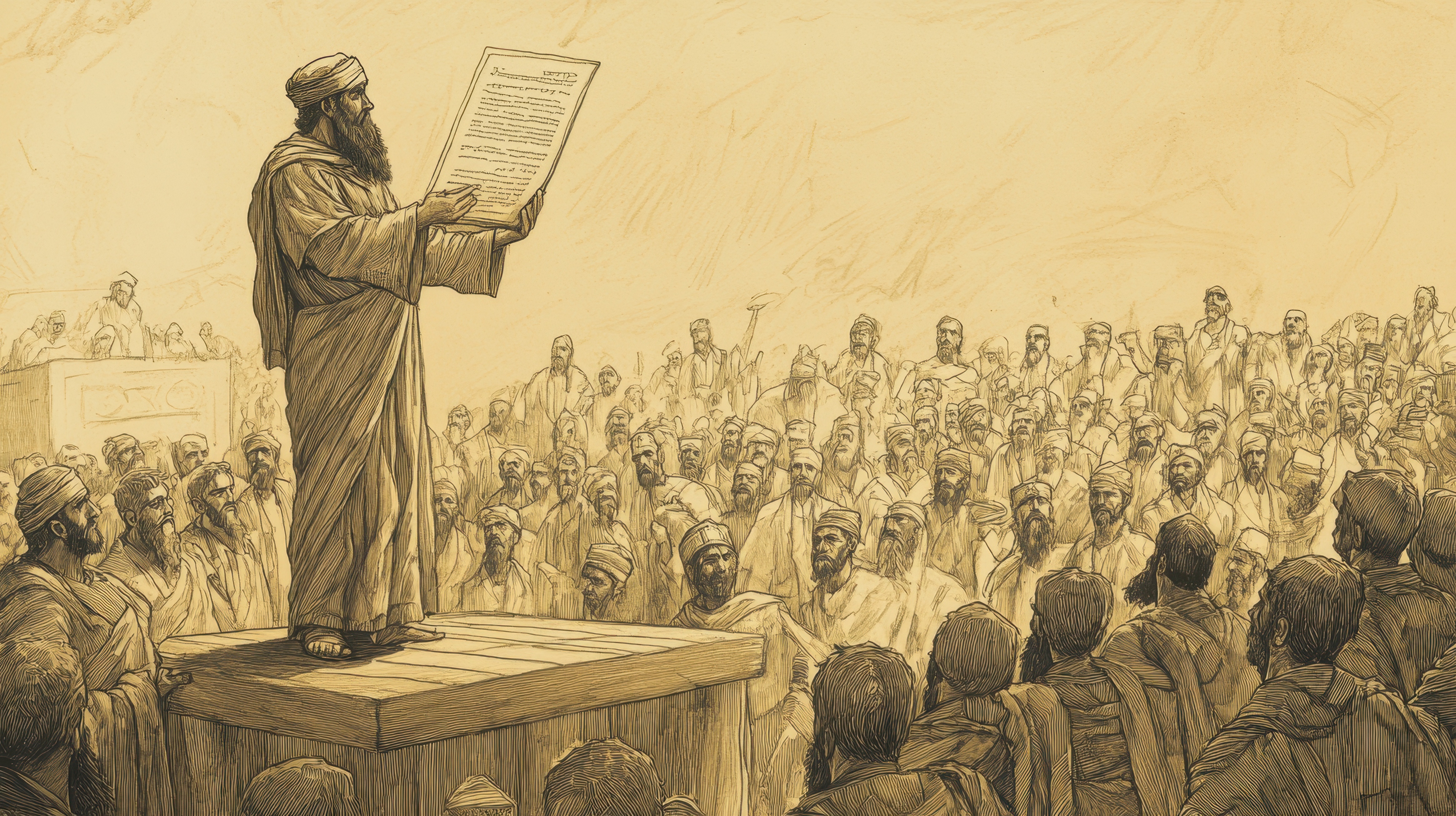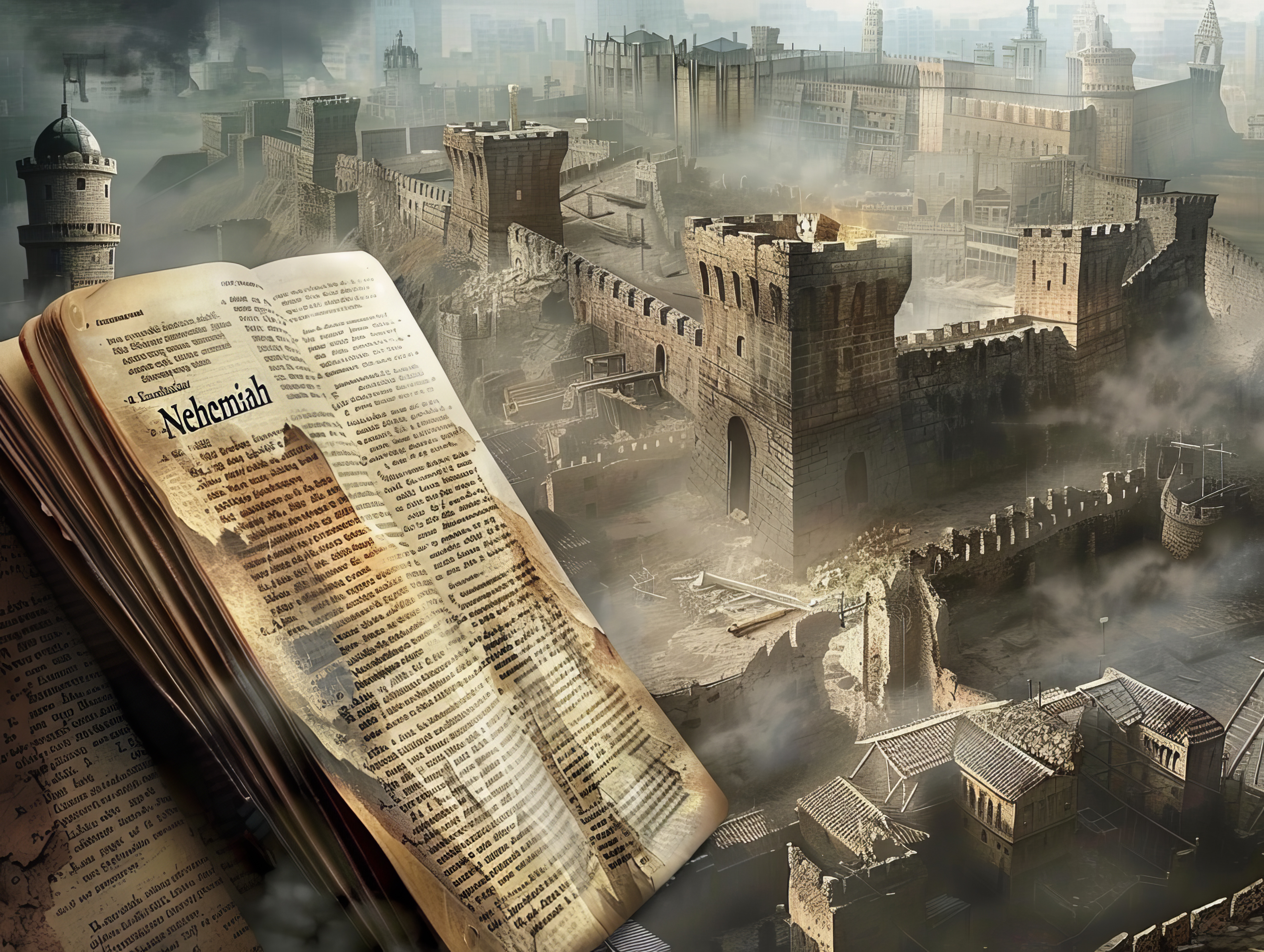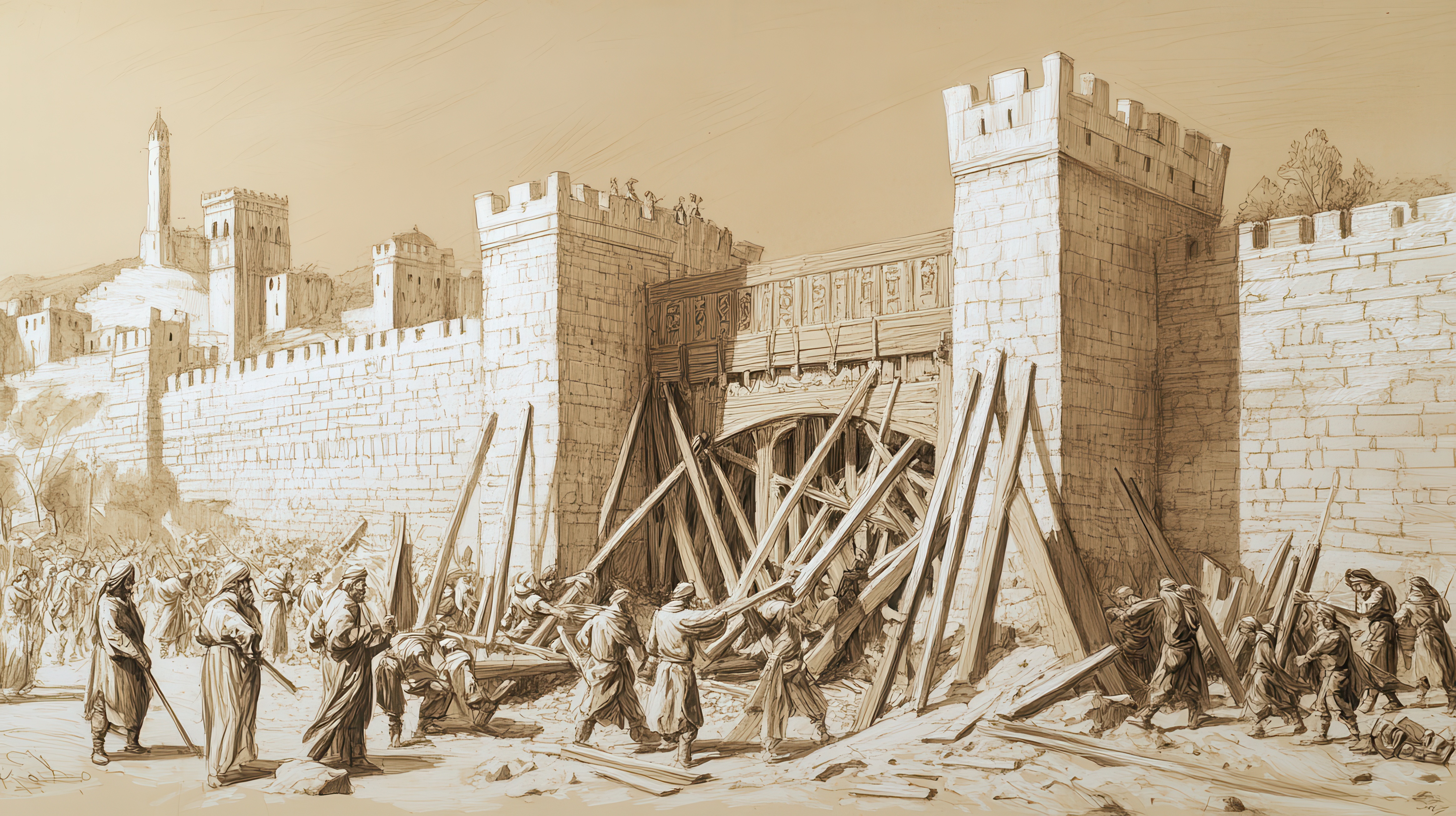Nehemiah 8-12 Renewed Hearts

The day has come for the people to hear and understand the Law of Moses. They have renewed hearts and great things happen because of it.
Nehemiah is at the end of his rebuilding project, but he doesn’t want to leave until the people have returned to their God. Knowing His Law and understanding it is only the first step. Many more will quickly follow. Let’s rejoin the people as they gather to hear the words of the Lord. Lead us Holy Spirit to where You would have Your story go.
♥ ♦ ♥
Ezra stands on the platform ready to begin the most impactful reading of his life. The words are not his, that he will be reading, but the Lord’s. He has the scroll with the Law of Moses rolled to the beginning. He holds it reverently in his arms as he steps up on the platform prepared for him.
The priests and Levites take their places as well. On Ezra’s right side are Mattithiah, Shema, Anaiah, Uriah, Hilkiah, and Maaseiah. On the left side are Pedaiah, Mishael, Malchijah, Hashum, Hashbaddanah, Zechariah, and Meshullam. All these men stand on the ground, lining the sides of the platform. There is a step on the front of the platform that holds those who will interpret for the people the words Ezra reads from the scroll. Twelve Levites in total wait for Ezra’s words so that they may help the people to understand God’s words. This is important because the words Ezra will be reading are written in Hebrew. With the Babylonian exile, many of the people have forgotten their native language. The Levites will translate as well as explain.
Two men stand on either side of Ezra. They will hold the scroll and advance it as he reads. Ezra hands the bottom rollers of the scroll to the man on his right. A hush falls over the congregation and they all stand as Ezra unknots the cord holding the scroll closed. He carefully lays this cord around his neck. Ezra carefully unrolls a portion of the scroll and gives the man on the left the rollers that hold the body of the scroll. As He reads to the people, the man on his right will advance the scroll, allowing the next section of reading to be before him. He uses a small pointer to mark where he is reading so that both men will know when it is time to advance the scroll.
Ezra is now ready to begin reading. He looks out at the people and sees their hungry eyes. The WANT to hear the words of their God.
“‘I am the Lord your God, who brought you out of Egypt, out of the land of slavery. You shall have no other gods before me. You shall not make for yourself an image in the form of anything in heaven above or on the earth beneath or in the waters below. You shall not bow down to them or worship them; for I, the Lord your God, am a jealous God, punishing the children for the sin of the parents to the third and fourth generation of those who hate me, but showing love to a thousand generations of those who love me and keep my commandments’” (Exodus 20:1-6).
The first words out of Ezra’s mouth, when translated and explained, bring a flood of silent tears. If it were not for the fact that they want to hear more, there would be wails of mourning issuing forth from the people. They KNOW their sin, and the sins of those before them.
Ezra continues to read from morning until midday. The Levites translate and explain the meaning of the words Ezra reads. There is not a dry eye or an uplifted head in the entire congregation, including the priests and Levites by the time Ezra reads the final words. ALL have seen their sins revealed in the clarity of the words read this day. The people bow their faces to the ground and worship the Lord their God.
Nehemiah’s heart aches with his fellow Jews, but he also knows that today is a sacred day. It is a new moon, and God called His people to celebrate on such days. To recognize His hand in keeping the world together, in spite of all that man does to ‘undo’ His work. After giving the people a few minutes to compose themselves following the reading, Nehemiah, Ezra, and the Levites who translated and explained the Law for the people, stand together before them.
Nehemiah raises his hands. The people all focus their eyes on him. “I know that the reading of the Law of God has laid our hearts bare, but ‘this day is holy to the Lord your God; do not mourn or weep… Go your way. Eat the fat and drink sweet wine and send portions to anyone who has nothing ready, for this day is holy to our Lord. And do not be grieved, for the joy of the Lord is your strength’ (Nehemiah 8:9-10).”
The Levites also encourage the people. “Be quiet, for this day is holy; do not be grieved” (Nehemiah 8:11).
The people dry their eyes and begin to break up into small groups. Those that are left standing alone are quickly absorbed into groups near them and encouraged to join them for a meal. It takes a little time for the heaviness of the people’s spirits to lift, but by the end of the day, laughter rang through the streets of the city. Children chased one another, men shared amusing stories, and the women found joy in one another’s company.
Nehemiah has hopes of completing the rolls while the people are all gathered together, but he does not want to interrupt the healing that is taking place in the community. “It can wait until another day” he finally tells himself. And he can’t help but smile as he looks out over the people.
The joy is so great, that many find it difficult to close out the day and go home. New friendships are made and old ones are strengthened. As the people part ways, they make sincere promises to reconnect again.
Any who choose to remain in the city are welcome to do so, as a journey home in the dark is not always safe. Many of those who live nearby also open their homes to new and old friends.
When the gates are opened the next morning, the people begin their slow journey home. None are in a hurry.
There are some who stay behind. The heads of father’s houses remain in the city. They want to know more of the Lord’s words, so as to teach their families. They meet with the priests, the Levites, Nehemiah, and Ezra to study the law more carefully.
A wonderful question and answer session emerges as the group goes through the Law more carefully. At some point, the festivals that the Lord has called His people to becomes the topic of discussion.
“Passover and the feast of unleavened bread is the most important season in the history of the people. We must be certain to observe it when the time comes.”
“I agree that we must be faithful in observing it, but there are other feasts that the Lord has called us to celebrate together in His city.”
“What ones would those be?”
“There are two other holy days that He calls for His people to assemble and observe together. The first is Passover. It is celebrated on the 14th of Nisan. The second is the Feast of Weeks, which follows 50 days after Passover is observed. And the final one is the Feast of Tabernacle, which happens on the 15th day of the seventh month. All these feasts, the people gather together to celebrate. There are other feasts and holy days…”
“WAIT! This is the seventh month! We MUST celebrate the Feast of Tabernacle. What are we supposed to do for this feast?”
Ezra retrieves the scroll and advances it to the place where Moses spoke of the feasts to the Lord. “Here it is” he says. Then he begins reading the requirements.
“Say to the Israelites: ‘On the fifteenth day of the seventh month the Lord’s Festival of Tabernacles begins, and it lasts for seven days. The first day is a sacred assembly; do no regular work. For seven days present food offerings to the Lord, and on the eighth day hold a sacred assembly and present a food offering to the Lord. It is the closing special assembly; do no regular work.
(“‘These are the Lord’s appointed festivals, which you are to proclaim as sacred assemblies for bringing food offerings to the Lord—the burnt offerings and grain offerings, sacrifices and drink offerings required for each day. These offerings are in addition to those for the Lord’s Sabbaths and in addition to your gifts and whatever you have vowed and all the freewill offerings you give to the Lord.)
“‘So beginning with the fifteenth day of the seventh month, after you have gathered the crops of the land, celebrate the festival to the Lord for seven days; the first day is a day of sabbath rest, and the eighth day also is a day of sabbath rest. On the first day you are to take branches from luxuriant trees—from palms, willows and other leafy trees—and rejoice before the Lord your God for seven days. Celebrate this as a festival to the Lord for seven days each year. This is to be a lasting ordinance for the generations to come; celebrate it in the seventh month. Live in temporary shelters for seven days: All native-born Israelites are to live in such shelters so your descendants will know that I had the Israelites live in temporary shelters when I brought them out of Egypt. I am the Lord your God’” (Leviticus 23:33-43).
“We must do this” Hanani says to the group gathered. All heads nod.
“We will have to call the people together again.”
“From the way so many of them were reluctant to leave, I don’t think that is going to be a problem.”
“We need to get the word out right away. This last gathering had such short notice that some had a real challenge attending.”
“Let’s send the message out today. That way the people will have time to make whatever arrangements ate necessary for an extended stay away from their homes.”
“You realize that those with large flocks will most likely not be able to attend.”
“I don’t think many of our people have the resources yet for ‘large flocks.’”
“Maybe after we observe the Lord’s feasts, He will bless us with that gift.”
“That is highly possible, but NOT the reason to attend.”
“We also need to think about the number of booths, where they will be placed, and the number of tree branches required for their construction.”
“I think we may be overthinking all of this. As happened with the ceremony yesterday, if the Lord wills it, it WILL happen. All we can do is prepare to the best of our abilities, and leave the rest in His hands.”
With that said, and agreed upon by all in attendance, preparation begins for the Feast of Tabernacle. Word goes out to the people that same day. Those in and around Jerusalem are asked to open their gates and allow others to erect booths in their open spaces. Those with homes are encouraged to make their booths on their roofs, to allow more room for visitors. And maps are drawn for the people to point out where the specified trees grow in abundance. The leaders have done all they can. It’s time to leave it in God’s hands.
“You are to assemble in Jerusalem by the 15th day of the month for the Feast of Tabernacle, which is proclaimed by the Lord and commanded to assemble together. This feast will last eight days, beginning and ending with a solemn observance. We will make ‘booths’ to live in to commemorate the fact that our people lived in tents for 40 years in the wilderness. These booths will be made of branches with palm, willow, and other leafy trees. Space and resources will be available for all.”
Most of the people are excited to be going back to Jerusalem. Some are worried about their animals in the extended absence. “Who will feed them? Who will take them to water? Who will tend them if they become ill?”
“Don’t you think God is big enough to care for our animal” more than one wife asks her husband.
Most agree that God is able, but there are a few holdouts. “We will honor the Lord by caring for the animals He has blessed us with and observe the festival here at home.”
Fortunately, those choosing this option are few and far between.
Jerusalem is once again overflowing with people. It is wonderful to be rekindling the friendships made a few weeks ago. As the people arrive, they begin by following the map to trees for making booths. They work together constructing booths as none of them have done this before. There is great laughter and a bit of frustration as the city changes into one filled with homemade shelters.
The people observe the solemn day for the start of the feast. It is a time they all reflect on the words Ezra read in their presence a little more than two weeks ago. Nehemiah instructs all of them to remain joyful and thankful during this celebration. He promises that there will be a time for repentance, after this season ends.
The city is filled with joy and fellowship; of bonding of the congregation. Ezra reads from the Book of the Law every morning and evening. The people drink in the stories of God’s hand on His people. Stories from creation until they reached the Promised Land. Every story that Moses included is read to the people over the time of the feast. There had never been a more joyous celebration of the Feast of Tabernacle since the time of Joshua, the son of Nun, when the people first entered the Promised Land.
Nehemiah took advantage of this gathering as well and updated the rolls of the people. He also compiled a list of those in authority over each of the cities in the land of Judah. He will set the leadership and representation in order AFTER the feast ends and the time of repentance passes. God’s work is more important.
The eighth day is a solemn assembly again. The people gather in the square to hear Ezra read the Law of God to them once again. This brings them back to the place of repentance they have been waiting for. They have personally repented, but not corporately.
After Ezra concludes his reading, Nehemiah steps forward. “I know that we all felt the weight of the words of God’s Law the first time Ezra read them to us. We did not have a time of repentance as a nation. If you are like me, you repented of your own sins between then and now. But I believe that we need to do this as a whole people; as His children. Today is not the day for that to happen, but tomorrow is.”
Nehemiah notices heads lifting and smiles appearing as well as nodding heads making the crowd appear as if it was a shifting sea. He is most pleased to see this response. “The people are ready Lord” he quietly speaks to his God.
“Tomorrow morning, we will meet here in the square, and make ourselves right with our Lord; as much as any man can. This is a time for those born of Israel alone. A time of mourning.”
This night sees the people reflecting on what is to come in the morning and preparing their hearts. The laughter has quieted, and the exuberance of the festival has calmed. There is still joy in the people’s hearts, but it is a different kind of joy. A joy born of becoming right with the Lord again.
Morning dawns and the people rise. This day, they fast. No one touches food or drink as they dress for the day. Instead of putting on their beautiful robes, the people put on sackcloth. They cover their heads with dirt before assembling in the square. They all wait while the morning sacrifice is offered.
The congregation does not have a single foreigner among them and they face the Temple of the Lord instead of the water gate. They watch from beyond the entrance as the priests conclude the morning sacrifice. Ezra moves to stand before the people again, with his two assistants beside him. He reads from the Law of Moses for a quarter of the day. He reads the requirements of obedience and the blessing and curse associated with following the Lord.
The people stand silent as Ezra reads from the Book of the Law. The curse read by Ezra strikes especially deep as they have just lived the very words of the Lord, because of the sins of their fathers.
“We cannot let this happen again! We must protect our children from what we have suffered. The only way to do so is to return to the Lord with ALL our heart” cries out Nehemiah. “We must confess our sins as a nation to have the favor of the Lord once again on our people.”
After Nehemiah calls out to the people, the Levites call to them as well. “Stand up and bless the Lord your God from everlasting to everlasting. Blessed be your glorious name, which is exalted above all blessing and praise” (Nehemiah 9:5). Then they go on to recite all of God’s faithfulness to His people, from the calling on Abraham to their return from exile. They site all of the peoples’ sins and unfaithfulness to the Lord, sparing or hiding none of it.
The Levites ended the confession to the Lord with a new solemn promise. One that would be written down and signed.
“Now, therefore, our God, the great, the mighty, and the awesome God, who keeps covenant and steadfast love, let not all the hardship seem little to you that has come upon us, upon our kings, our princes, our priests, our prophets, our fathers, and all your people, since the time of the kings of Assyria until this day. Yet you have been righteous in all that has come upon us, for you have dealt faithfully and we have acted wickedly. Our kings, our princes, our priests, and our fathers have not kept your law or paid attention to your commandments and your warnings that you gave them. Even in their own kingdom, and amid your great goodness that you gave them, and in the large and rich land that you set before them, they did not serve you or turn from their wicked works. Behold, we are slaves this day; in the land that you gave to our fathers to enjoy its fruit and its good gifts, behold, we are slaves. And its rich yield goes to the kings whom you have set over us because of our sins. They rule over our bodies and over our livestock as they please, and we are in great distress.
“Because of all this we make a firm covenant in writing; on the sealed document are the names of our princes, our Levites, and our priests” (Nehemiah 9:32-38).
And this is just what they do. The chief priest reads out the covenant that the people are agreeing to.
“The rest of the people, the priests, the Levites, the gatekeepers, the singers, the temple servants, and all who have separated themselves from the peoples of the lands to the Law of God, their wives, their sons, their daughters, all who have knowledge and understanding, join with their brothers, their nobles, and enter into a curse and an oath to walk in God’s Law that was given by Moses the servant of God, and to observe and do all the commandments of the Lord our Lord and his rules and his statutes. We will not give our daughters to the peoples of the land or take their daughters for our sons. And if the peoples of the land bring in goods or any grain on the Sabbath day to sell, we will not buy from them on the Sabbath or on a holy day. And we will forego the crops of the seventh year and the exaction of every debt.
“We also take on ourselves the obligation to give yearly a third part of a shekel[c] for the service of the house of our God: for the showbread, the regular grain offering, the regular burnt offering, the Sabbaths, the new moons, the appointed feasts, the holy things, and the sin offerings to make atonement for Israel, and for all the work of the house of our God. We, the priests, the Levites, and the people, have likewise cast lots for the wood offering, to bring it into the house of our God, according to our fathers’ houses, at times appointed, year by year, to burn on the altar of the Lord our God, as it is written in the Law. We obligate ourselves to bring the firstfruits of our ground and the firstfruits of all fruit of every tree, year by year, to the house of the Lord; also to bring to the house of our God, to the priests who minister in the house of our God, the firstborn of our sons and of our cattle, as it is written in the Law, and the firstborn of our herds and of our flocks; and to bring the first of our dough, and our contributions, the fruit of every tree, the wine and the oil, to the priests, to the chambers of the house of our God; and to bring to the Levites the tithes from our ground, for it is the Levites who collect the tithes in all our towns where we labor. And the priest, the son of Aaron, shall be with the Levites when the Levites receive the tithes. And the Levites shall bring up the tithe of the tithes to the house of our God, to the chambers of the storehouse. For the people of Israel and the sons of Levi shall bring the contribution of grain, wine, and oil to the chambers, where the vessels of the sanctuary are, as well as the priests who minister, and the gatekeepers and the singers. We will not neglect the house of our God” (Nehemiah 10:28-39).
After the people hear what they are committing to, they cry “Amen” as one voice. Since there is no dissention, Nehemiah, the priest, the Levites, and the leaders of the people’s houses sign the covenant. The high priest seals it with his signet ring. It is done and it is binding upon the people. But it is also a pleasure for the people.
Before returning to the king, Nehemiah has one last thing to put in order. He has to repopulate the city of Jerusalem. Until now, business was conducted here, but there are very few houses or people actually living in the city. The Leaders live here, but a healthy city requires more than that. It needs families to inhabit it and make it their home.
All the people enroll in this lottery. One out of every ten people are chosen to remain in Jerusalem and make a life for themselves here. They will receive aid in making dwellings for themselves, but will become active members of the community in support of themselves.
There were some who willingly volunteered to live in the city. The people praised them for their actions. All of those not chosen in the lottery or who volunteered are released to return to their homes. The people ‘settle in’ in the seventh month and become a nation again instead of splinter groups of returnees.
Nehemiah can now go back to Susa in peace and confidence. His people are safe and off to a good start. “I will return again, someday” he promises himself as he waves goodbye to the friends he leaves behind.
(to be continued)
There is a time for every purpose under heaven. During this season of returning to the Lord, there was a time for joy and a time for weeping. A time for repentance and a time for recommitment. A time for making bonds and a time for laying them down.
There are seasons in each of our lives. I have found in mine that the time for repentance usually precedes the time of joy. Removing the sin from my life opens up the conduit of joy that the Lord longs to fill my heart with. I wonder if I would have been able to ‘celebrate’ after that first reading of the Law. Would I have been so focused on what was wrong that I didn’t enjoy just being God’s child?
With my history, I have to say; probably yes. I have had times when I have done that very thing. I become so overwhelmed with what is wrong, that I overlook or minimize the joy that is around me. For that, I am TRULY sorry.
Father God, help me find Your joy in ALL I do. Help me not be caught up in things having to be perfect or even running smoothly before allowing Your joy to fill my heart.
THANK YOU for the times when Your songs of praise bubble to the surface and fill me with Your joy. And THANK YOU that those times are not dependent on everything going right. You push them to the surface most often when things are crumbling around me. You sustain me with Your joy! I’ll take it ANY DAY and TWICE on Sunday!




